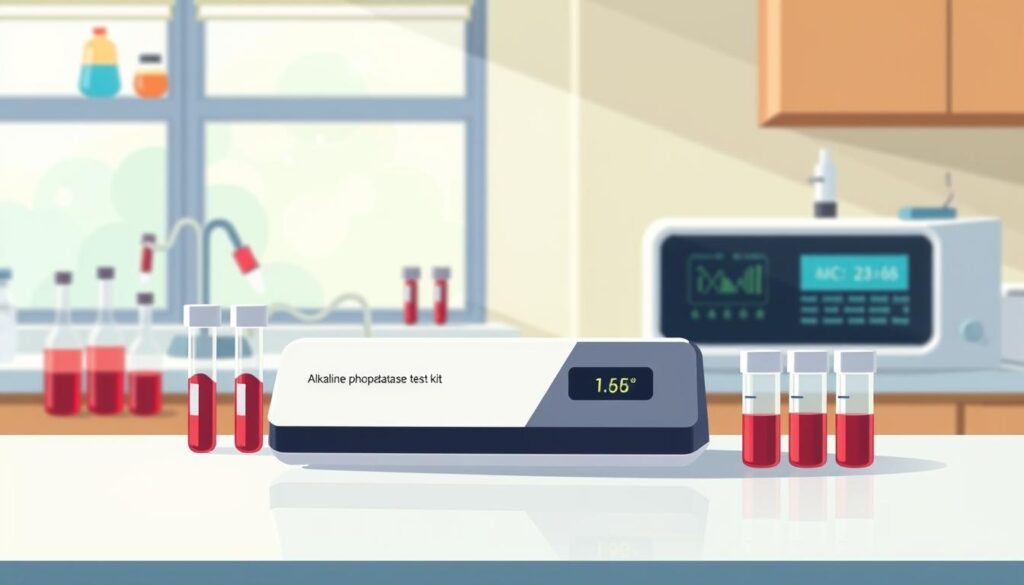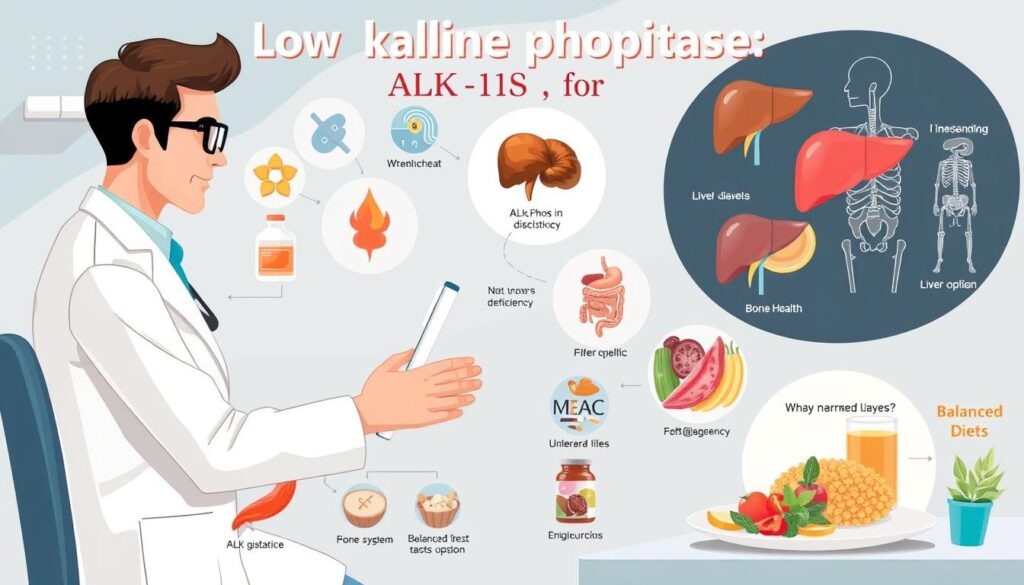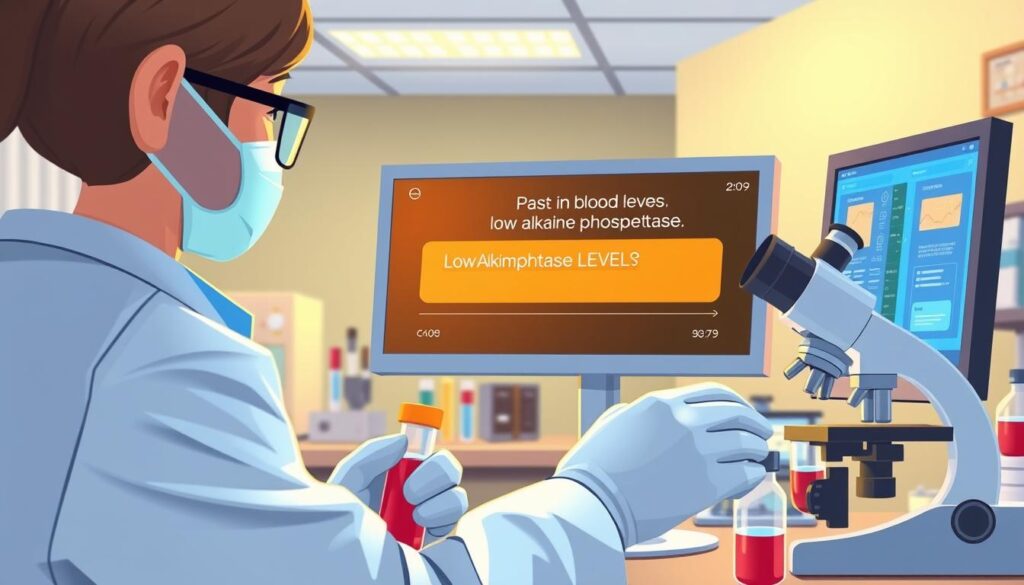|
Getting your Trinity Audio player ready...
|
Dr. Nivedita Pandey is a top expert on bone disorders. She explains what low alkaline phosphatase (ALK Phos) levels mean. This guide covers everything from what it is to how to treat it.
If you’re worried about your bones or just want to know more, this article is for you. It talks about the medical conditions linked to low ALK Phos levels. This includes rare genetic disorders like hypophosphatasia.
Learn how to manage low ALK Phos levels with diet and enzyme therapy. Also, find out about new treatments and clinical trials. By the end, you’ll know how to protect your bone health.
Table of Contents
ToggleUnderstanding Low ALK Phos Levels
Definition and Causes
Alkaline phosphatase (ALP) is a key enzyme in our bodies. It’s mostly found in the liver, bones, kidneys, and intestines. Low ALP levels, or low ALK Phos, can happen for many reasons.
These reasons include genetic conditions, not getting enough nutrients, liver disease, and other health problems.
Epidemiology and Risk Factors
Low ALK Phos levels are more common in adults. Some groups are at higher risk. This includes people with certain genetic conditions or chronic health issues.
- The normal range for a serum ALP level in healthy adults is 20 to 140 IU/L, according to a 2013 research review.
- ALP levels run higher in children and decrease with age.
- Conditions like anemia, hypothyroidism, Cushing’s syndrome, and hypophosphatasia can lead to low alkaline phosphatase levels.
- Children with achondroplasia and cretinism have lower alkaline phosphatase levels.
Knowing about low ALK Phos levels is key. It helps us spot and deal with health issues early.
Diagnosis of Low ALK Phos Levels
Figuring out why your alkaline phosphatase (ALK Phos) levels are low starts with a blood test. This test checks how much of this important enzyme is in your blood. Doctors might also do more tests to find out why your ALK Phos levels are low.
Alkaline Phosphatase (ALP) Test
The ALP test is key for checking your liver and bone health. It looks for odd levels of the enzyme, which can show problems with your liver, bile ducts, or bones. This test is part of bigger health checks, giving a full picture of your health.
Other Diagnostic Tests
Doctors might also suggest other tests to find the cause of low ALK Phos levels. These could be:
- Liver function tests to see how your liver is doing
- Bone density scans to check bone health
- Genetic testing for rare conditions like hypophosphatasia
By using these tests together, doctors can figure out why your ALK Phos levels are low. Then, they can make a treatment plan just for you.

Medical Conditions Associated with Low ALK Phos Levels
Low alkaline phosphatase (ALK Phos) levels in the blood can signal health issues. High levels often mean liver or bone problems. But low levels might point to other health concerns.
One common reason for low ALK Phos is liver disease. This includes hepatitis or cirrhosis. These conditions make it hard for the liver to make this enzyme, lowering ALK Phos levels.
Kidney disease can also cause low ALK Phos. Kidney problems with phosphate can mess up the balance of this mineral. This leads to less ALK Phos being made.
Not getting enough vitamins and minerals is another reason. This can happen if you don’t eat well or have gut problems. These issues make it hard to absorb nutrients.
Lastly, genetic disorders like hypophosphatasia can cause low ALK Phos. These rare conditions affect bone and tooth mineralization. They make it hard for the body to produce and control ALK Phos.
If you’re worried about your ALK Phos levels, talk to your doctor. They can find out why and help you get better. Fixing the problem can help your ALK Phos levels get back to normal.
Hypophosphatasia: A Rare Genetic Disorder
Hypophosphatasia is a rare genetic bone disorder. It is caused by low levels of the enzyme alkaline phosphatase (ALP). This disorder affects bone and tooth mineralization, leading to various symptoms.
Symptoms and Diagnosis
The symptoms of hypophosphatasia vary. They can range from severe skeletal issues and breathing problems in babies to milder symptoms like early tooth loss and bone pain in adults. Doctors use a mix of clinical checks, lab tests, and genetic tests to diagnose it.
Diagnosing hypophosphatasia can be hard because it’s rare. A global registry helps by finding symptoms early. This improves detection and treatment.
Treatment Options
New treatments for hypophosphatasia have come out, like enzyme replacement therapy with asfotase alfa (Strensiq). These aim to fix bone mineralization and manage the disorder’s effects.
Even adults with hypophosphatasia can show symptoms. This shows the need for early diagnosis and treatment. New therapies and trials are working to help those with this rare disorder.
Low ALK Phos Levels
Alkaline phosphatase (ALK Phos) is a key enzyme for our body. It helps with bone and liver health. Low ALK Phos levels can affect our health a lot. It’s important to know why, how, and what it means for our well-being.
The causes of low ALK Phos can be different. They include genetic issues like hypophosphatasia and health problems with the liver, kidneys, or diet. Age, sex, and some medicines can also change ALK Phos levels.
People with low ALK Phos might feel:
- Bone pain
- Muscle weakness
- Delayed growth and development in children
- Increased risk of fractures
The impact of low ALK Phos is big. This enzyme is important for many body functions. Low levels can harm bone health, liver function, and overall health. It’s key for doctors to find the cause and help patients get better.

To find why ALK Phos levels are off, doctors might do more tests. These include ALP isoenzyme tests, liver function tests, thyroid panels, or genetic tests. Knowing the cause helps doctors create the right treatment plan.
Management and Treatment of Low ALK Phos Levels
Managing low alkaline phosphatase (ALK Phos) levels needs a plan based on the cause. For those with low ALK Phos from not getting enough nutrients, changing what you eat can help.
Dietary Modifications
Eating more foods rich in vitamins and minerals for bones is key. This includes calcium, vitamin D, and phosphorus. Adding more dairy, leafy greens, fatty fish, and fortified foods to your diet can help.
Enzyme Replacement Therapy
For those with hypophosphatasia, a rare genetic disorder, enzyme replacement therapy is a new hope. Drugs like asfotase alfa (Strensiq) help fix bone and tooth problems. This aims to fix the low ALK Phos levels at the source.
Doctors and patients work together to create a treatment plan. This plan tackles the cause and symptoms of low ALK Phos. By fixing the root cause, people can manage their condition and feel better overall.
Impact on Bone Health and Development
Low alkaline phosphatase (ALK Phos) levels can harm your bones. This enzyme is key for bone mineralization. Low levels mean bones may not form right, leading to weak bones and a higher risk of fractures.
In children, low ALK Phos can mess up bone growth. This can cause skeletal problems and slow down physical growth.
Adults with low ALK Phos may have lower bone density. This increases the risk of osteoporosis and fractures. Research shows that osteoporosis-related fractures will likely rise in the U.S. by 2025. It’s important to find and treat the causes of low ALK Phos to keep bones healthy.
Studies link vitamin D deficiency to more falls and changes in bone function after fractures. They also show that osteoporosis risk is higher in post-menopausal women with hip fractures. This highlights the need to watch and manage bone health in these women.

Research also found that bone alkaline phosphatase changes with growth hormone therapy. This is true for adults with growth hormone deficiency. In hemodialysis patients with liver disease, total and bone-specific alkaline phosphatases have been studied. This shows how complex the link between ALK Phos levels and bone health is.
Complications and Associated Conditions
Low alkaline phosphatase (ALK Phos) levels can cause serious problems, especially with bone health. This can lead to rickets in kids and osteomalacia in adults. Both conditions make bones soft and weak, leading to big issues.
Rickets and Osteomalacia
Rickets in kids can cause bone deformities and slow growth. It also raises the chance of breaking bones. Osteomalacia in adults brings bone pain and muscle weakness. It also makes falling and breaking bones more likely.
Low ALK Phos levels are also linked to osteoporosis and more breaks. Doctors need to spot and treat these problems to help patients with low ALK Phos levels.
Knowing about the risks of low ALK Phos helps keep bones strong. Regular health checks and early treatment are key. They can prevent serious conditions and improve health.
Monitoring and Follow-up
Managing low alkaline phosphatase (ALK Phos) levels needs ongoing monitoring and care. Your doctor will suggest regular check-ups. These include blood tests to monitor ALK Phos levels and other tests to find the cause.
This helps catch any changes or problems early. It lets your doctor make the right changes to your treatment plan.
You might also have imaging tests, like bone scans. These check how low ALK Phos affects your bones. Regular monitoring and follow-up are key for the best results.
The study found that high ALP levels mean liver problems and a worse outlook. Watching ALP levels can show if the disease is getting worse. It’s a good way to check for liver metastases.
More studies are needed to understand ALP’s role in cancer. By tracking progress and going for regular check-ups, you and your doctor can manage low ALK Phos levels well.

Emerging Therapies and Clinical Trials
New treatments for low alkaline phosphatase (ALK Phos) levels are being developed. Researchers are looking into new drugs and ways to treat the condition. One exciting area is enzyme replacement therapy, like asfotase alfa (Strensiq), which helps with bone health and genetic disorders.
If you have low ALK Phos levels, it’s important to know about these new treatments. Your doctor might suggest joining clinical trials to test these new therapies. Working with your healthcare team can help you find the best treatment for your condition.
Here are some important things to know about new treatments and clinical trials for low ALK Phos levels:
- Enzyme replacement therapies, like asfotase alfa, are showing promise in improving bone health and managing symptoms of genetic disorders associated with low ALK Phos.
- Patients may be encouraged to participate in clinical trials to evaluate the safety and effectiveness of new treatments for low ALK Phos.
- Staying informed about the latest advancements in the field and collaborating with healthcare providers can help individuals explore the best treatment options for their specific needs.
By keeping up with new treatments and clinical trials for low ALK Phos levels, you can work with your healthcare team. This way, you can make informed choices and possibly get the latest and best treatments.
Conclusion
Low alkaline phosphatase (ALK Phos) levels can affect your health a lot. They are important for bone growth and mineralization. Knowing why your levels are low is key to fixing the problem.
Working with your doctor is important. They can help you find the right treatment. This could be changing your diet, getting enzyme therapy, or joining clinical trials.
It’s important to keep an eye on your health and go back to the doctor often. This helps avoid serious problems later. Thanks to new research, people with low ALK Phos can live better lives.
Staying informed and working with your doctor is crucial. This helps you manage low ALK Phos levels. It also improves your bone health and overall well-being.
FAQ
What is alkaline phosphatase (ALP) and what do low ALP levels indicate?
Alkaline phosphatase (ALP) is an enzyme found in many body tissues. It’s most common in the liver, bones, kidneys, and intestines. Low ALP levels can mean genetic issues, poor nutrition, liver problems, or other health issues.
What are the common causes of low ALK Phos levels?
Low ALK Phos levels can be caused by hypophosphatasia, a rare bone and tooth disorder. They can also be due to malnutrition, liver disease, or some medicines.
How are low ALK Phos levels diagnosed?
Doctors start by testing your blood for ALP levels. They might also do liver tests, bone scans, and genetic tests to find the cause.
What medical conditions are associated with low ALK Phos levels?
Low ALK Phos levels can point to liver disease, kidney issues, malnutrition, and genetic disorders like hypophosphatasia.
What is hypophosphatasia, and how is it related to low ALK Phos levels?
Hypophosphatasia is a rare genetic disorder with low ALK Phos levels. It affects bone and tooth mineralization. Doctors use tests and genetic analysis to diagnose it.
How do low ALK Phos levels impact bone health and development?
Low ALK Phos affects bone mineralization. This can weaken bones and increase fracture risk, especially in kids. It can also mess up bone growth and development.
What are the potential complications associated with low ALK Phos levels?
Low ALK Phos levels can lead to rickets in kids and osteomalacia in adults. They also raise the risk of osteoporosis and fractures.
How is low ALK Phos levels managed and treated?
Treatment includes diet changes and enzyme replacement therapy. For genetic disorders like hypophosphatasia, asfotase alfa (Strensiq) is used.
What emerging therapies and clinical trials are available for low ALK Phos levels?
New treatments for low ALK Phos levels are being researched. This includes enzyme replacement therapy and clinical trials to test new treatments.
Source Links

Dr. Nivedita Pandey
Dr Nivedita Pandey is a Gastroenterologist in Delhi, Trained in the U.S and provides pre transplant evaluation as well as post-liver transplant care. She is compassionate and caring and is most well known for being a patient listener and spending ample time with patients.
Related Blog Posts
High ALK Phos in Blood Work: Causes & What to Do Next
March 29, 2025





